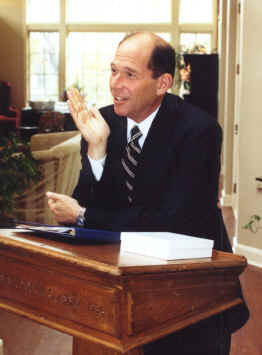This Is Hartford's Triumph
By Evan S. Dobelle
The following appeared on the op-ed page of the Hartford Courant, September 3, 2000.
 W
W
The opening of the Learning Corridor is a moment of triumph: The triumph of a new urbanism over the failed strategies of the past. The triumph of bold ideas over the status quo, of collaboration over politics and infighting. The triumph of hope over despair. This is Hartford's triumph. As Gov. John G. Rowland said at the Learning Corridor groundbreaking, this "will be a model for the country."
We have set the stage for a neighborhood revitalized and reborn as a community dedicated to the promise of children. The Learning Corridor has gone from vision to reality. To those more prone to skepticism and doubtful second-guessing than to optimism and can-do thinking, I have said that this project would succeed because it had to. Failure was not an option.
The project had to succeed because the people in our neighborhood had had their hopes dashed too many times already. It had to succeed for the children who are this city's and this nation's future, children who needed to be inspired to believe that there is a path--a corridor, if you will--that can lead them from preschool all the way to college and beyond.
Mark Twain, one of Hartford's greatest sons, once wrote, "It's easier to stay out than get out." He was right. But Hartford is our neighborhood, our city--and in Trinity's case, for 177 years, our home. We educated many of the city's leaders. We are a significant force in its economy. We care about Hartford and its future. We draw on the city and the city draws on us. Our vitality and the city's vitality are linked.
Trinity and its partners in the Southside Institutions Neighborhood Alliance--Hartford Hospital, Connecticut Children's Medical Center, the Institute of Living, and Connecticut Public Television & Radio--rejected the arrogant and misguided strategy of setting out to shape the world in their own, preferred images. Instead, we invited all stakeholders to participate in defining the vision and setting the agenda for renewal of a community that belonged to all of us. No solution was imposed from on high. We brought questions, not answers, to the table. And, just as importantly, we insisted that egos be left at the door. While Trinity and SINA have garnered praise for the Learning Corridor and related initiatives, we have been but one voice among many, driven only to see the widely shared hopes for this community, the hopes of those who call this neighborhood home fulfilled.
Although we may feel triumphant on this momentous occasion, we are not yet victorious and must not be lulled even momentarily into self congratulation or complacency. Victory is not ours to claim yet, because there are more battles to wage. But we can move forward confident in the knowledge that we have found and applied a winning strategy in the SINA neighborhoods--one that can be used again and elsewhere in Hartford and that ought to be applied in other cities across the country.
We have seen that community-building based on a strategy of coalition-building can work. We have seen that nonprofit institutions are prepared and able to serve as change agents and catalysts, playing a leadership role that in many urban centers is up for grabs. We have seen that education has a place at the core of urban renewal strategies.
John F. Kennedy said once, "Our progress as a nation can be no swifter than our progress in education..... The human mind is our fundamental resource." As cities in this country seek to renew themselves and to plant the seeds of economic development, may they not fail to recognize education as a chief instrument in effecting progress. The focus on revitalizing America's cities must be matched by a commitment to revitalizing American education.
Today we celebrate how far we have come, but tomorrow our work continues. Oliver Wendell Holmes once observed that "the great thing in the world is not so much where we stand, as in what direction we are moving." As Hartford moves confidently forward, buoyed by recent successes like the Learning Corridor, let us focus not on our weaknesses and liabilities but on our strengths and our assets, and let us rededicate ourselves to shaping our own destiny.
The words "I'm sorry" seem to be in fashion today, coming from politicians in public life or private corporations, or anyone wanting to "spin" and move quickly past yet another failure or unfulfilled promise. There is no "sorry" coming from Trinity today. We are happy and proud to have delivered on a promise. And we are deeply grateful for the enormous and broad support that has flowed to the college, to SINA, and to the Learning Corridor project directly, making this something so many people in this city and state can take pride in.